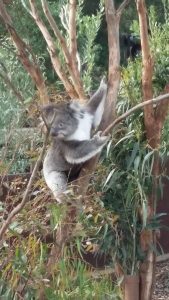Róisín Read in Melbourne
I recently had the privilege of going to Melbourne to share some of the research from HCRI’s projects on humanitarian data (funded through the Impact Acceleration Account) and the larger ESRC-funded project on peacekeeping data in Darfur. In addition to presenting at the ‘Winning the Peace and Post-Conflict Reconstruction Workshop’ hosted by the Alfred Deakin Institute for Citizenship and Globalisation (more on this in a minute), the trip also gave me an opportunity to find out more about fascinating research being carried out at other universities in the area (and see some koalas).
Of particular note was a Global Frictions seminar (if you are in the area, this series is well worth checking out) hosted by RMIT University’s Centre for Global Research on ‘Doing Statebuilding Better?’. The lively debate brought a surprisingly positive spin on the future of statebuilding, especially from Dr. Joanne Wallis from ANU, with more cautious optimism coming from the other members of the panel, Dr Lisa Denney and Dr. Charles Hunt. It was interesting to hear about the research focused on statebuilding in the Asia-Pacific region, which tends to be less studied in the UK and Europe than African or Balkan contexts.
The ‘Winning the peace’ workshop at Deakin, organised by Dr. Anthony Ware and Dr. Filip Slaveski, sought to create a truly interdisciplinary space to explore questions of post-conflict transformation, bringing together historians, humanitarian, development and international relations scholars with practitioners to discuss themes comparatively across cases, both contemporary and historical. Hearing about Prof. Jonathan Goodhand’s current project on Afghanistan exploring the importance of personal narratives from the margins and borderlands for understanding conflict transitions was a particular highlight. For my own research, it was enlightening to hear from historians on the post-Soviet transitions and to identify many commonalties with South Sudan.
In addition to drinking excellent coffee and seeing adorable antipodean wildlife, the trip also gave me an opportunity to catch up with colleagues from the Centre for Humanitarian Leadership to hear about their on-going teaching and research projects and explore opportunities for future collaboration with HCRI. Some really interesting research happening across the city’s many universities definitely makes the LONG flight worth it.



0 Comments